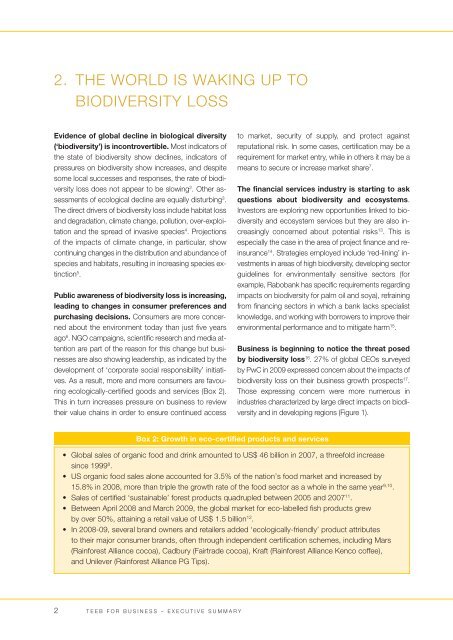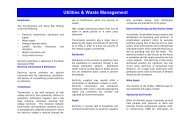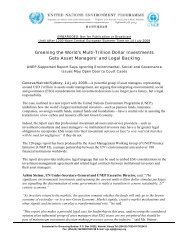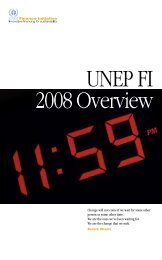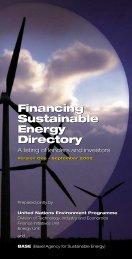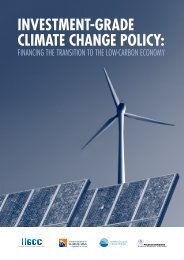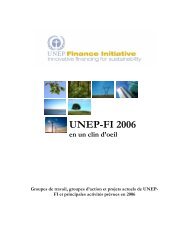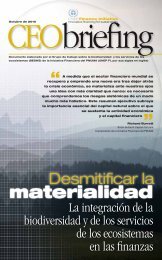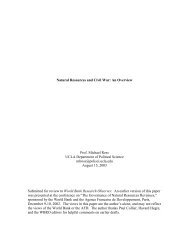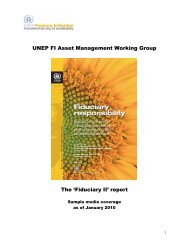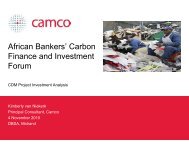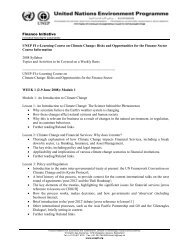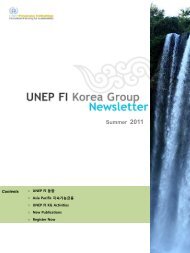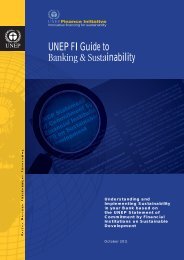for Business - TEEB
for Business - TEEB
for Business - TEEB
Create successful ePaper yourself
Turn your PDF publications into a flip-book with our unique Google optimized e-Paper software.
2. THE WORLD IS WAKING UP TO<br />
BIODIVERSITY LOSS<br />
Evidence of global decline in biological diversity<br />
(‘biodiversity’) is incontrovertible. Most indicators of<br />
the state of biodiversity show declines, indicators of<br />
pressures on biodiversity show increases, and despite<br />
some local successes and responses, the rate of biodiversity<br />
loss does not appear to be slowing 2 . Other assessments<br />
of ecological decline are equally disturbing 3 .<br />
The direct drivers of biodiversity loss include habitat loss<br />
and degradation, climate change, pollution, over-exploitation<br />
and the spread of invasive species 4 . Projections<br />
of the impacts of climate change, in particular, show<br />
continuing changes in the distribution and abundance of<br />
species and habitats, resulting in increasing species extinction<br />
5 .<br />
Public awareness of biodiversity loss is increasing,<br />
leading to changes in consumer preferences and<br />
purchasing decisions. Consumers are more concerned<br />
about the environment today than just five years<br />
ago 6 . NGO campaigns, scientific research and media attention<br />
are part of the reason <strong>for</strong> this change but businesses<br />
are also showing leadership, as indicated by the<br />
development of ‘corporate social responsibility’ initiatives.<br />
As a result, more and more consumers are favouring<br />
ecologically-certified goods and services (Box 2).<br />
This in turn increases pressure on business to review<br />
their value chains in order to ensure continued access<br />
to market, security of supply, and protect against<br />
reputational risk. In some cases, certification may be a<br />
requirement <strong>for</strong> market entry, while in others it may be a<br />
means to secure or increase market share 7 .<br />
The financial services industry is starting to ask<br />
questions about biodiversity and ecosystems.<br />
Investors are exploring new opportunities linked to biodiversity<br />
and ecosystem services but they are also increasingly<br />
concerned about potential risks 13 . This is<br />
especially the case in the area of project finance and reinsurance<br />
14 . Strategies employed include ‘red-lining’ investments<br />
in areas of high biodiversity, developing sector<br />
guidelines <strong>for</strong> environmentally sensitive sectors (<strong>for</strong><br />
example, Rabobank has specific requirements regarding<br />
impacts on biodiversity <strong>for</strong> palm oil and soya), refraining<br />
from financing sectors in which a bank lacks specialist<br />
knowledge, and working with borrowers to improve their<br />
environmental per<strong>for</strong>mance and to mitigate harm 15 .<br />
<strong>Business</strong> is beginning to notice the threat posed<br />
by biodiversity loss 16 . 27% of global CEOs surveyed<br />
by PwC in 2009 expressed concern about the impacts of<br />
biodiversity loss on their business growth prospects 17 .<br />
Those expressing concern were more numerous in<br />
industries characterized by large direct impacts on biodiversity<br />
and in developing regions (Figure 1).<br />
Box 2: Growth in eco-certified products and services<br />
• Global sales of organic food and drink amounted to US$ 46 billion in 2007, a threefold increase<br />
since 1999 8 .<br />
• US organic food sales alone accounted <strong>for</strong> 3.5% of the nation’s food market and increased by<br />
15.8% in 2008, more than triple the growth rate of the food sector as a whole in the same year 9,10 .<br />
• Sales of certified ‘sustainable’ <strong>for</strong>est products quadrupled between 2005 and 2007 11 .<br />
• Between April 2008 and March 2009, the global market <strong>for</strong> eco-labelled fish products grew<br />
by over 50%, attaining a retail value of US$ 1.5 billion 12 .<br />
• In 2008-09, several brand owners and retailers added ‘ecologically-friendly’ product attributes<br />
to their major consumer brands, often through independent certification schemes, including Mars<br />
(Rain<strong>for</strong>est Alliance cocoa), Cadbury (Fairtrade cocoa), Kraft (Rain<strong>for</strong>est Alliance Kenco coffee),<br />
and Unilever (Rain<strong>for</strong>est Alliance PG Tips).<br />
2 T E E B F O R B U S I N E S S – E X E C U T I V E S U M M A R Y


